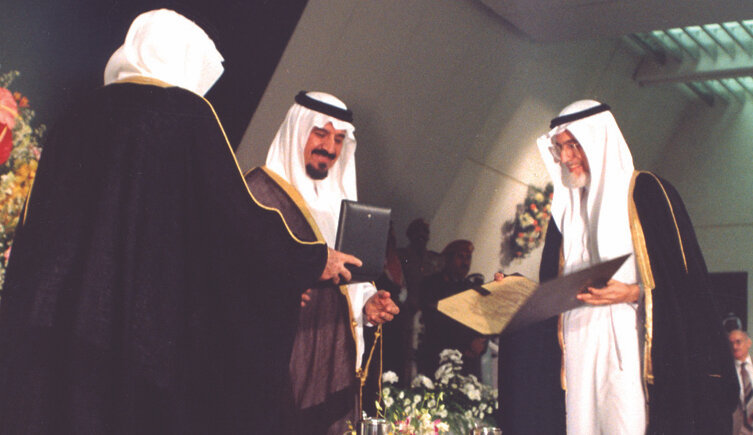Saudi Arabia Mourns the Passing of Esteemed Scholar and Former MWL Chief Abdullah Omar Naseef at 86
Riyadh – Saudi Arabia and the wider Islamic world are mourning the loss of Dr. Abdullah Omar Naseef, a distinguished scholar, humanitarian, and former Secretary-General of the Muslim World League (MWL), who passed away at the age of 86.
Dr. Naseef’s remarkable life and career left an enduring legacy of education, interfaith dialogue, and service to Islam, earning him international recognition and respect across communities.
Funeral prayers for the late scholar were held on Sunday at Al-Juffali Mosque in Jeddah, followed by his burial at Al-Asad Cemetery.
Family members, colleagues, and admirers gathered to honor a man remembered not only for his leadership but for his humility, integrity, and lifelong dedication to promoting peace and knowledge.
A Life Devoted to Service and Knowledge
Born in Jeddah in 1939, Dr. Abdullah Naseef earned his bachelor’s degree in chemistry from King Saud University in 1964 before pursuing an academic career that would span continents and inspire generations.
He rose to become president of King Abdulaziz University in Jeddah, where his leadership was marked by a vision to strengthen research and expand opportunities for Saudi students in science and higher education.
His scholarly and humanitarian journey took him well beyond academia. Dr. Naseef served as Deputy Chairman of the Saudi Shoura Council, where he was highly respected for his balanced views and unwavering commitment to national progress.
He also led the Muslim World League (MWL) as its Secretary-General, representing Saudi Arabia in global forums from 1983 to 1993, promoting Islamic unity, and advocating for constructive dialogue among civilizations.
An International Ambassador of Peace and Education
Dr. Naseef’s influence extended across borders. He represented the Kingdom at countless international conferences, where he consistently promoted understanding between nations and faiths.
His leadership helped strengthen the Muslim World League’s role as a bridge for global cooperation, emphasizing Islam’s universal values of compassion, justice, and knowledge.
He also co-founded and led several international educational and cultural institutions, including Dar Al-Islam in New Mexico, the Islamic College in Chicago, and the Islamic Academy in Cambridge.
He served as vice president of the International Islamic University in Islamabad and chaired the boards of prominent institutions such as the Islamic Cultural Centers in Geneva and Sydney, and the Institute for the History of Arabic and Islamic Sciences at the University of Frankfurt.
Dr. Naseef was also deeply engaged in humanitarian causes through his work with the International Islamic Relief Organization, World Muslim Congress, and International Islamic Council for Dawah and Relief.
His decades of service earned him numerous accolades, the most notable being the King Faisal Prize for Service to Islam in 1991, recognizing his outstanding leadership and contributions to Islamic education and international cooperation.
A Legacy of Leadership and Dialogue
Tributes poured in from across the globe following his passing. Faisal bin Muammar, founding secretary-general of the King Abdullah bin Abdulaziz International Center for Interreligious and Intercultural Dialogue, wrote on X (formerly Twitter):
“My deepest condolences and sympathy on the passing of Abdullah Omar Naseef, who departed this life after a distinguished journey filled with scholarly and humanitarian contributions. He was always a symbol of balance and wisdom — a man whose social and humanitarian legacy will be fondly remembered.”
Dr. Naseef also played a vital role in youth and community development, serving on the World Scout Committee and leading the International Union of Muslim Scouts. He viewed youth engagement as a cornerstone of building a responsible, ethical future generation.
As Chairman of the Abdullah bin Omar Naseef Charitable Foundation, he championed numerous initiatives in education and social welfare. His vision for humanitarian service was rooted in the belief that empowering individuals through education and compassion strengthens societies as a whole.
Remembered as a Scholar of Humanity and Faith
In his decades of service, Dr. Abdullah Omar Naseef embodied the essence of faith in action — using knowledge as a tool for peace, dialogue, and development. His scholarly work and leadership bridged cultures and nations, leaving behind an invaluable legacy of learning and understanding.
Today, Saudi Arabia and the global Muslim community remember him not only as a distinguished academic and leader but as a beacon of moral integrity and compassion, whose contributions will continue to inspire future generations.



